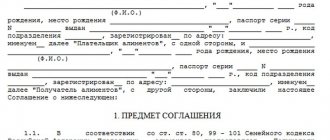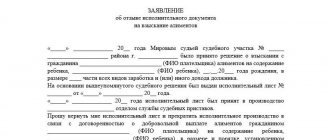The responsibility to support their minor children is also assigned to persons recognized by the court as incompetent, and is fulfilled from the funds available to them by their guardians, medical institutions or institutions of the social protection system in which they are located. This obligation does not depend on the parents having the necessary funds.
So, for example, if a child is already over 18 years old, but for good reasons is not able to work (disability, mental illness, etc.), then he can notify his parents about this, who will be obliged to help him financially. What are the responsibilities of parents in raising and maintaining children? Attending various medical and psychological examinations of a child is the right of parents, as well as protecting the interests of their minor offspring
When collecting alimony on the basis of a court order, the judge does not pay any attention to the specific circumstances of the case, but only collects alimony in accordance with the rates established in Art. 81 IC RF. As a result, the scope of application of this method is very limited.
Plaintiffs in cases of collection of alimony can be: one of the child’s parents, the adoptive parent, if the adoption was made by one person while maintaining the personal non-property and property rights and obligations of the child with the other parent (clause 3 of Article 137 of the RF IC), guardian (trustee), adoptive parents, the administration of the organization in which the child was placed without parental care (Clause 2 of Article 155.2 of the RF IC). When collecting alimony, these persons act on behalf of the child as his legal representatives and exercise the child’s subjective right to receive maintenance from his parents. Therefore, the refusal of a parent or persons in loco parentis to receive alimony for minor children is not permitted by law.
Responsibilities of parents for the upbringing and maintenance of children according to the Family Code
In particular, in accordance with Article 80 of the RF IC, the duties of parents to raise and support children are traditional, and therefore the state notes the advantage of this obligation. This obligation means that until the child turns 18 and becomes a formal adult, his parents are obliged to provide for his needs for food, rest, treatment, entertainment and clothing. Moreover, this obligation is voluntary, which means that no one puts pressure or coercion on parents.
Such agreements cannot be oral, and therefore must be certified by a notary and drawn up in writing. If at some point one of the parents begins to ignore the obligations assigned to him, then in this case the agreement may be considered void, and the second parent will receive the necessary circumstances to appeal to the courts.
Until what age does a child legally have to live with his parents?
Parental rights are understood as a set of rights and responsibilities that are vested in parents as subjects of parental legal relations (parental legal relations are legal relations between parents and children). Parental rights are understood as a set of rights and responsibilities that are vested in parents as subjects of parental legal relations (parental legal relations are legal relations between parents and children). The personal non-property rights of parents include: the right to raise and educate children, the right to protect the rights and interests of children, the right to protect parental rights.
You might be interested ==> Alabaster is Dangerous
If the rental transaction is carried out on other grounds and the tenant is a teenager in the rental agreement, then this is relatively not a big deal for the apartment owner. The maximum that can happen is that the transaction is declared invalid and all existing legal relations are nullified.
It is noted that the onset of adulthood does not always guarantee a person’s financial independence. There are often cases when a child reaches 18 years of age while still studying at school - in grades 10-11. In this regard, he does not have the opportunity to fully combine study and work.
“The bill proposes to supplement the Family Code of the Russian Federation (FC RF) with a new article 85.1, which provides for the obligation of parents to support their able-bodied adult children who need help until they receive general education,” the Moscow Agency cites the text of the explanatory note.
Until what age should parents support their children?
here is the age Federal Law of April 9, 2007 No. 43-FZ “On Amendments to the Federal Law “On State Pension Provision in the Russian Federation” Adopted by the State Duma on March 23, 2007 Approved by the Federation Council on March 30, 2007 Article 1 Introduce into Federal Law of December 15, 2001 No. 166-FZ “On state pension provision in the Russian Federation” (Collected Legislation of the Russian Federation, 2001, No. 51, Art. 4831; 2002, No. 30, Art. 3033; 2003, No. 27, Art. 2700; 2004, No. 35, Article 3607) the following changes: 1) paragraph ten of Article 2 should be stated as follows: “disabled citizens - disabled people, including disabled people since childhood, disabled children, children under 18 years of age, as well as over this age, full-time students in educational institutions of all types and types, regardless of their organizational and legal form, with the exception of educational institutions of additional education, until they complete such training, but no longer than until they reach the age of 23 years, who have lost one or both parents, and children of a deceased single mother, citizens from among the small peoples of the North who have reached the age of 55 and 50 years (men and women, respectively), citizens who have reached the age of 65 and 60 years (men and women, respectively) who do not have the right to pension provided for by the Federal Law “On Labor Pensions in the Russian Federation.”; 2) paragraph four of paragraph 1 of Article 11 should be worded as follows: “children under the age of 18, as well as over this age, studying full-time in educational institutions of all types and types, regardless of their organizational and legal form, with the exception of educational institutions additional education, until they complete such training, but no longer than until they reach the age of 23 years, who have lost one or both parents, and children of a deceased single mother, who are not entitled to a survivor’s pension provided for by the Federal Law “On Labor Pensions in Russian Federation", or a survivor's pension in accordance with Articles 8 and 10 of this Federal Law; "; 3) subparagraphs 1 and 2 of paragraph 1 of Article 18 should be stated as follows: “1) citizens from among the small peoples of the North who have reached the age of 55 and 50 years (men and women, respectively), citizens who have reached the age of 65 and 60 years (men and women, respectively) women), disabled people with a second degree limitation in their ability to work (with the exception of people with disabilities since childhood), children under the age of 18, as well as older than this age, studying full-time in educational institutions of all types and types, regardless of their organizational legal form, with the exception of educational institutions of additional education, until they complete such training, but no longer than until they reach the age of 23 years, who have lost one of their parents - 100 percent of the size of the basic part of the old-age labor pension provided for by the Federal Law “On Labor Pensions” in the Russian Federation" for citizens aged 60 and 55 years (men and women, respectively). At the same time, the size of the social pension for disabled people with a disability of the second degree (with the exception of disabled people since childhood), and the social pension for children under the age of 18, as well as over this age, studying full-time in educational institutions of all types and types regardless of their organizational and legal form, with the exception of educational institutions of additional education, until they complete such training, but no longer than until they reach the age of 23 years, having lost one of their parents, cannot be less than 470 rubles per month;
You may like => Are there any benefits for Kindergarten Payment for Kindergarten Workers?
§ Can choose (with the consent of the parents) a place of residence (Article 20.26 of the Civil Code of the Russian Federation) § Conclude any transactions (with the written consent of the parents - Article 26 of the Civil Code of the Russian Federation) § Have the right to independently dispose of their earnings, scholarships, and other income (Art.
- The Convention on the Rights of the Child was adopted by the UN and supported by the entire world community (more details in the article: in what year was the Convention on the Rights of the Child adopted?);
- The Constitution of the Russian Federation establishes the fundamental rights and freedoms of all citizens of our country;
- The Family Code of the Russian Federation regulates relationships within the family, the interaction of children with parents;
- The Civil Code contains information on the procedure for the adoption of minors;
- The Administrative Code is used in case of improper care and supervision of a child;
- Law 124-FZ “On Basic Guarantees of the Rights of the Child in the Russian Federation”;
- Law 273-FZ “On Education”;
- other regulatory documents.
Each case is considered individually, the submitted documents and evidence are studied, the financial condition of not only the adult, but also the parent from whom alimony is being collected is assessed. In addition, you need to make sure whether the child can provide for his needs and requirements without outside help. It is also determined whether there are additional revenues, including social benefits and other income.
The second condition is material need. Since there is no such concept at the legislative level, the judge, when making a decision, is guided by the living wage established in Russia. It may differ in each region. Not only the income, but also the expenses of the disabled child are taken into account.
Article 80 of the RF IC
However, the law does not make the availability of sufficient funds a condition for the occurrence of this obligation. Parents must share the income they receive with their children, even in cases where paying child support would lead to incomplete satisfaction of their own needs. Almost all alimony legal relations are generated by complex factual structures. The only exception is the obligations of parents to support minor children: they arise from one legal fact - the origin of the child, duly certified. However, even in this case, when refusing to voluntarily pay alimony, a legal fact such as a court decision that has entered into legal force is required.
3. A claim for the collection of alimony may be brought by the guardianship and trusteeship authority in the absence of an agreement between the parents on the payment of alimony, in the absence of provision of maintenance to minor children, and in the absence of one of the parents filing a claim in court. Alimony can be collected by the court at the request of one of the parents both during the marriage and after its dissolution.
Maintenance of parents by children
Sometimes it happens that in the agreement the parents did not initially take into account the terms of payment of child support after the child reaches adulthood. In this case, you can always and without any problems make appropriate changes to the document and extend its validity. This requires the consent of both parties.
8. A parent living separately from the child has the right to have something in common with the child, to participate in his upbringing and in resolving issues related to the child’s education (clause 1 of Article 66 of the RF IC), and the parent with whom the child lives should not interfere with the implementation of this rights.
Despite the measures taken by the government of the Russian Federation, the number of dysfunctional families does not decrease and even increases with each new year. Preventive measures only produce results in situations where the existing problem has not yet become irreversible. Only in such cases can guardianship authorities not apply harsh sanctions against parents.
- protect the rights and interests of children without harming their psychological and physical health, or their moral values;
- organize the educational process without disregard for the life and health of children, without rude and degrading communication;
- provide basic education in state, municipal and any other institutions with a similar status;
- create comfortable conditions for receiving secondary education, including special education;
- fully comply with the established Charter of the educational institution and fulfill certain rights and responsibilities of parents at school;
- provide conditions within which children will develop normally;
- support all minor children from a financial point of view.
If we agree with the logic of the court, according to which, due to the relationship between parents and son, family relations are permanently preserved, then these relations will have the status of perpetual and uninterruptible, and parents until their death are obliged to provide their able-bodied and adult child with maintenance in the form of living in their apartment , undergoing all the associated deprivations and restrictions of their right to use residential premises.
You might be interested ==> Responsibilities of an Assistant Cadastral Engineer
Thus, in itself, cohabitation, running a common household between the owner of the residential premises and the person he moved into this residential premises is not a mandatory condition for recognizing him as a member of the family of the owner of the residential premises. However, the absence of a common household by the owner of the residential premises with the specified person, the termination of the common household (for example, by mutual agreement), or separation in itself cannot indicate the termination of family relations with the owner of the residential premises.
If an adult daughter or son continues their studies and therefore needs financial assistance, parents are obliged to support them until they reach twenty-three years of age, provided that they can provide financial assistance. The right to file a claim in court for the collection of alimony has the right of the parent with whom the daughter or son lives, as well as the daughter or son themselves who are continuing their studies. As a general rule, parents must support their children until they reach the age of majority, i.e. However, there are cases when adult children also have the right to support. According to the IC of Ukraine, parental support obligations arise in relation to: 1 adult disabled children, Art.
Article 61. Equality of rights and responsibilities of parents1. Parents have equal rights and bear equal responsibilities towards their children (parental rights).2. Parental rights provided for in this chapter are terminated when children reach the age of eighteen (the age of majority), as well as when minor children marry and in other cases established by law when children acquire full legal capacity before they reach adulthood. Article 62. Rights of minor parents 1. Minor parents have the right to live together with the child and participate in his upbringing.2. Unmarried minor parents, in the event of the birth of a child and when their maternity and (or) paternity are established, have the right to independently exercise parental rights upon reaching the age of sixteen. Parents do not have the right to represent the interests of their children if the guardianship and trusteeship authority determines that there are contradictions between the interests of parents and children. In case of disagreements between parents and children, the guardianship and trusteeship authority is obliged to appoint a representative to protect the rights and interests of the children. Article 65. Exercise of parental rights1. Parental rights cannot be exercised in conflict with the interests of children. Ensuring the interests of children should be the main concern of their parents. When exercising parental rights, parents do not have the right to cause harm to the physical and mental health of children, or their moral development.
- free medical care in hospitals;
- provision of an educational program, the opportunity to attend educational institutions;
- have your own first name, last name and patronymic;
- obtain citizenship of the country by birthright;
- to be protected from information and propaganda, which in one way or another may negatively affect morale, the educational process and upbringing;
- not having or having lost his family, the baby can count on care and support from the state.
In situations where the parents do not have sufficient funds to compensate for the harm, and the person involved in the offense has such funds, the courts may demand compensation for harm from the actual guilty party. The property rights and obligations of parents are also affected in transactions concluded by minor children under 14 years of age.
You might be interested ==> Child Rights
If the parents managed to reach specific agreements, then they need to draw up a child support agreement and have it certified by a notary. Only in this case will the document have legal force. If the parent subsequently refuses to transfer the money, the agreement can be transferred to the bailiff service for enforcement. SSP employees will take measures to receive money that do not contradict the law:
The law sets an age limit after which alimony payments are not due. This is due to the fact that after this moment the teenager grows up, will be able to find a job, independently satisfy his material needs, provide for his family, and even support his disabled parents.
If the child is not yet one year old, then the husband cannot independently file for divorce and appear in court. To perform these manipulations, it is imperative to obtain the permission of your spouse. Additionally, it should be noted that the same procedure is performed if the wife is pregnant. In this way, legislation tries to protect a woman at a time when she is most vulnerable. Child support for a child up to one year can only be paid if the case is considered in court. However, for its part, the legislation is trying to delay the moment of divorce. Child support for a child up to one year is assigned only if both parties confirm their consent. The decision is made in court.
Today it is difficult for a disabled person to find a job that would allow him to support himself. That is why the mother or father is obliged to transfer a certain amount of funds every month. The process continues even after the disabled person turns 18. For the calculation, the formulas given above are used.
Do parents have an obligation to support their adult able-bodied children?
In the textbook “Family Law of Russia” L.M. Pchelintseva states: “Due to the lack of a definition of family in the UK and different interpretations of its nature and characteristic features in a number of branches of law (civil, housing, labor law, social security law), the definitions of family proposed in the scientific literature are not always unambiguous.” “There is also no generally accepted definition of family in modern legal literature.” “P.I. Sedugin gives the concept of family as a certain aggregate (community, group) of people according to the general rule of relatives, based on marriage, kinship and property, living together and running a common household, forming a natural environment for the well-being of its members, raising children, mutual assistance, procreation" ( see Commentary on the Family Code of the Russian Federation / Under the general editorship of P. V. Krasheninnikov and P. I. Sedugin. - Moscow, 1977. - P. 2). “He believes that there is an urgent need for a legislative concept of “family”, which would have industry-wide significance.” “However, I.M. Kuznetsova emphasizes that the absence of a general definition of family in the UK is not an accident. The concept of family is sociological, not legal. In legal acts, the concept of family is associated with the establishment of the circle of family members who form its composition, and it is defined differently, depending on the goals of legal regulation in various branches of law. Therefore, the inclusion of a definition of the concept of “family” in the Family Code and the establishment of an exhaustive list of persons classified as family members may lead to a violation of their rights or an unreasonable expansion of the circle of family members” (Pchelintseva L.M. Family Law of Russia. - Moscow: publishing house “Norma” , INFRA-M", 2012. - pp. 12–14).
You might be interested ==> Lawyer's Income Certificate
Based on the foregoing, in our opinion, sufficient evidence of the termination of family relations is the filing of a statement of claim by the parents to the court to recognize their adult and able-bodied son as having lost the right to use their apartment. Moreover, this logic is not only legal, but also everyday, corresponding to the essence of things, the principles of relations between parents and grown children. A child who has reached adulthood must support himself. From this time on, the parents’ responsibility for its maintenance ceases. If parents continue to provide assistance to their adult child, then this is their right, not their responsibility.
Maintenance of parents by children
The question arises: which method of collecting child support is preferable if the parent hides his place of work and the amount of income he receives? Answer: in this case, the best way is to collect alimony in a fixed amount using a multiple of the minimum wage. In addition, the collection of alimony in a fixed sum of money will complicate the hidden spouse’s decision on the possibility of reducing the amount of alimony due to a changed financial situation.
Is it possible to collect alimony for the maintenance of my wife? Until how many years is child support paid? Is it possible to claim child support after 18 years of age? Does the law provide for child support for parents? In our article we will talk about special types of child support payments for persons who are not minor children.
What does the child's other parent owe you?
General terms and Conditions. Both parents are required to support their minor children. This obligation does not depend on the registration of marriage - an entry in the birth certificate is sufficient. Child support can be requested by the parent with whom the child lives. If the spouses divorced and the child remained with the mother, the father will pay child support, and vice versa.
- How do parents agree? Any amount can be specified in the alimony payment agreement; it may not be tied to income. For example, parents can agree that the child’s father transfers 10 thousand rubles every month for his maintenance.
- As a percentage of income. By default, child support for one child is 25% of income, for two children - 33%, for three - 50%. Income is salary, earnings from business or regular investments. One-time transactions such as the sale of an apartment do not affect alimony.
- In a fixed size. If the father does not have a confirmed income or an incredibly small salary, you can demand from him not 25%, but a fixed amount.
Responsibilities of parents to children, and until how many years they are required to support them by law
Art. 80 of the Family Code of the Russian Federation as of 2021 establishes that parents are obliged to support children under the age of majority. This rule, established by law, was in effect in 2021 and in previous years; there were no new changes in the legislation.
The guardianship and trusteeship authority, within a month from the date of receipt of the information specified in paragraph one of this paragraph, is obliged to send documented information about the child left without parental care to the relevant executive authority of the constituent entity of the Russian Federation for recording in the regional data bank about children left without parental care, organizing his placement in a family of citizens of the Russian Federation on the territory of a given subject of the Russian Federation and simultaneous referral to the appropriate federal executive body for recording in the federal data bank about children left without parental care, in accordance with the Federal Law of April 16, 2001 N 44-FZ “On the state data bank on children left without parental care.”
You might be interested ==> Administrative Law Problems With Answers Grade 9
Let’s say an apartment costs 1.5 million rubles. Maternal capital for the first child is 466 thousand rubles. The husband’s share of the money is 155 thousand, which is approximately 1/10 of the apartment. That is, provided that he has not spent a single ruble of his money, simply upon the birth of a child, a man can receive 10% in different apartments if he has children.
General terms and Conditions. Both parents are required to support their minor children. This obligation does not depend on the registration of marriage - an entry in the birth certificate is sufficient. Child support can be requested by the parent with whom the child lives. If the spouses divorced and the child remained with the mother, the father will pay child support, and vice versa.











